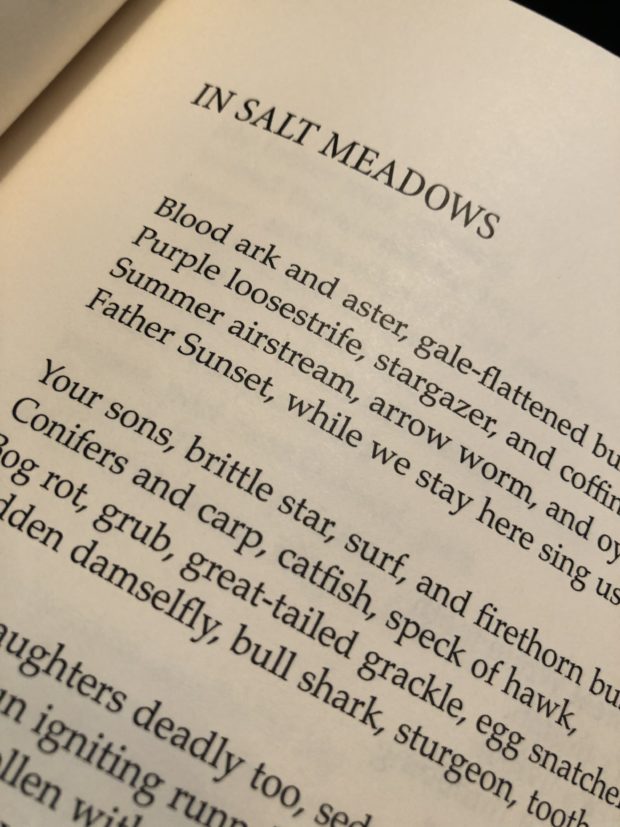My poem “In Salt Meadows” (from a book-in-progress called Storm Swimmer) appears in the latest issue of The Hopkins Review (Volume 13, Number 2, Spring 2020, Johns Hopkins University Press).
Blood ark and aster, gale-flattened bulrush,
Purple loosestrife, stargazer, and coffin box,
Summer airstream, arrow worm, and oystercatcher,
Father Sunset, while we stay here sing us that song:
Your sons, brittle star, surf, and firethorn bush,
Conifers and carp, catfish, speck of hawk,
Bog rot, grub, great-tailed grackle, egg snatcher,
Sudden damselfly, bull shark, sturgeon, tooth and prong—
Your daughters deadly too, sedge and sea rocket, raccoon,
Last of sun igniting runnels, lava flow
To bay swollen with sponge, mosquito, and mudfish—
Sing of sorrows, cyphers, corals, and crows,
Ghost crab, nettle, anemone, moist moon
Bloomed to mushroom cap, glasswort, silvery minnow—
Rainwater course with salt, mixed like a wish,
The stories we survive, salt grass, and swamp rose.
About the Hopkins Review: “This literary gem, the rebirth of a short-lived review from the mid-twentieth century, publishes the finest in contemporary letters. Featuring fiction, poetry, memoirs, essays on literature, drama, film, the visual arts, music and dance, The Hopkins Review has been called a ‘postmodern blend of intellectual heft and Vaudeville’ by Susan McCallum-Smith of WYPR and Urbanite magazine. Contributors include literary and scholarly heavyweights such as Max Apple, John Barth, Donald Barthelme, Millard Kaufman, Frank Kermode, and many others.”
” . . . the voice most characteristic of Mr. Hilbert’s work sounds something like a punk-rock Wordsworth, or a heavy-metal Milton, melding grandeur and the Grand Guignol, squalor and prophecy, in a kind of snarling sublime. In Caligulan, this voice fulfilled its potential: trash, noise, madness, death, and chaos create a kind of ambient howl, like a vortex within which characters flung hither and thither frantically try to make sense of their lives. The effect is at once uncanny and undeniably familiar. Reading Caligulan is something like walking the neighborhood while listening to the second movement of Shostakovich’s String Quartet No. 8 on repeat.” – The Hopkins Review



No Comments